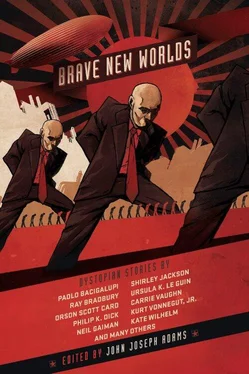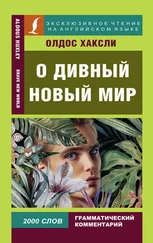BRAVE NEW WORLDS
DYSTOPIAN STORIES
Introduction
by JOHN JOSEPH ADAMS
Nineteen Eighty-Four, Fahrenheit 451 , and, of course, the book this anthology is named for— Brave New World —are the cornerstones of dystopian literature in novel form, but there has never, to my knowledge, been an anthology collecting all the best, classic works of dystopian short fiction in one volume. This book aims to do exactly that, spanning from 1948 to the present day, from what is perhaps The classic dystopian short story—"The Lottery" by Shirley Jackson — to stories just published in the last two years but which will surely stand the test of time.
The roots of the word dystopia — dys- and — topia — are from the Ancient Greek for "bad" and "place," and so we use the term to describe an unfavorable society in which to live. "Dystopia" is not a synonym for "post-apocalyptic"; it also is not a synonym for a bleak, or darkly imagined future. In a dystopian story, society itself is typically the antagonist; it is society that is actively working against the protagonist's aims and desires. This oppression frequently is enacted by a totalitarian or authoritarian government, resulting in the loss of civil liberties and untenable living conditions, caused by any number of circumstances, such as world overpopulation, laws controlling a person's sexual or reproductive freedom, and living under constant surveillance.
Whether or not a society is perceived as a dystopia is usually determined by one's point of view; what one person may consider to be a horrible dystopia, another may find completely acceptable or even nigh-utopian. For instance, if you don't care about procreating, then living in a world in which the birth rate is strictly regulated wouldn't seem very dystopic to you; to someone who values that very much, however, having society tell you how, when (or how often) you can procreate would seem like something out of a nightmare. Or a person who doesn't enjoy reading or intellectual thinking might not care if books are banned. or even hunted down and destroyed, as in Fahrenheit 451, whereas you, dear reader, would probably care very much.
Many societies in fiction are depicted as utopias when in fact they are dystopias; like angels and demons, the two are sides of the same coin. This seemingly paradoxical situation can arise because, in a dystopia, the society often gives up A in exchange for B, but the benefit of B blinds the society to the loss of A; it is often not until many years later that the loss of A is truly felt, and the citizens come to realize that the world they once thought acceptable (or even ideal) is not the world they thought it was. That's part of what is so compelling — and insidious — about dystopian fiction: the idea that you could be living in a dystopia and not even know it.
Dystopias are often seen as "cautionary tales," but the best dystopias are not didactic screeds, and the best dystopias do not draw their power from whatever political/societal point they might be making; the best dystopias speak to the deeper meanings of what it is to be one small part of a teeming civilization. and of what it is to be human.
And so here are thirty-three such stories, representing the best of what dystopian fiction has to offer. So read them, and be glad that doing so won't bring firemen to your door to burn all your books — and your house with them.
* * *
The following stories included in the Brave New Worlds trade paperback (9781-59780-221-5) have not been approved for electronic release by the Ministry of Truth and Decency: "Billennium," by J. G. Ballard; "The Pedestrian," by Ray Bradbury; “The Minority Report," by Philip K. Dick; and "Harrison Bergeron," by Kurt Vonnegut, Jr. Possession of unauthorized electronic versions of these stories may result in incarceration, disenfranchisement, or revocation of citizenship under the New Millennium Copyright and Loyalty Act (BNW-165A) of 2011. Save the State! Report all Pinks!
The Lottery
by SHIRLEY JACKSON
Shirley Jackson, best known for penning this classic story, was the author of several novels, such as We Have Always Lived in the Castle and The Haunting of Hill House, The latter of which has been adapted to film twice (both times as The Haunting ). She is also the author of dozens of short stories, which appeared in magazines including The New Yorker, Collier's, Good Housekeeping, Harper's, Mademoiselle, The New Republic, and The Magazine of Fantasy & Science Fiction.
Frequently anthologized and taught in classrooms around the world, "The Lottery" is a masterwork of dystopian fiction, and is a story whose influence can be felt in several of the other stories in this anthology.
Literature of the early twentieth-century is rich with characters struggling to understand the dwindling importance of rural life. Whether the small towns and agrarian communities were rejected by the characters or if their loss left them pining, there could be no doubt that rural communities were drying up. From Sherwood Anderson to John Steinbeck to the stage of Thornton Wilder, writer after writer tried to capture the end of era.
Science fiction and fantasy writers tackled the topic, too. Many of Ray Bradbury's greatest pieces are saturated with nostalgia for lost times in little country towns. In our first story, we offer you one of those small towns, a place not so different from Bradbury's beloved Green Town, Illinois. Like Green Town, it's full of ordinary people working hard to get by, who are drawn together by an annual ritual.
* * *
The morning of June 27th was clear and sunny, with the fresh warmth of a full-summer day; the flowers were blossoming profusely and the grass was richly green. The people of the village began to gather in the square, between the post office and the bank, around ten o'clock; in some towns there were so many people that the lottery took two days and had to be started on June 26th, but in this village, where there were only about three hundred people, the whole lottery took less than two hours, so it could begin at ten o'clock in the morning and still be through in time to allow the villagers to get home for noon dinner.
The children assembled first, of course. School was recently over for the summer, and the feeling of liberty sat uneasily on most of them; they tended to gather together quietly for a while before they broke into boisterous play, and their talk was still of the classroom and the teacher, of books and reprimands. Bobby Martin had already stuffed his pockets full of stones, and the other boys soon followed his example, selecting the smoothest and roundest stones; Bobby and Harry Jones and Dickie Delacroix — the villagers pronounced this name "Dellacroy" — eventually made a great pile of stones in one corner of the square and guarded it against the raids of the other boys. The girls stood aside, talking among themselves, looking over their shoulders at the boys, and the very small children rolled in the dust or clung to the hands of their older brothers or sisters.
Soon the men began to gather, surveying their own children, speaking of planting and rain, tractors and taxes. They stood together, away from the pile of stones in the corner, and their jokes were quiet and they smiled rather than laughed. The women, wearing faded house dresses and sweaters, came shortly after their menfolk. They greeted one another and exchanged bits of gossip as they went to join their husbands. Soon the women, standing by their husbands, began to call to their children, and the children came reluctantly, having to be called four or five times. Bobby Martin ducked under his mother's grasping hand and ran, laughing, back to the pile of stones. His father spoke up sharply, and Bobby came quickly and took his place between his father and his oldest brother.
Читать дальше











